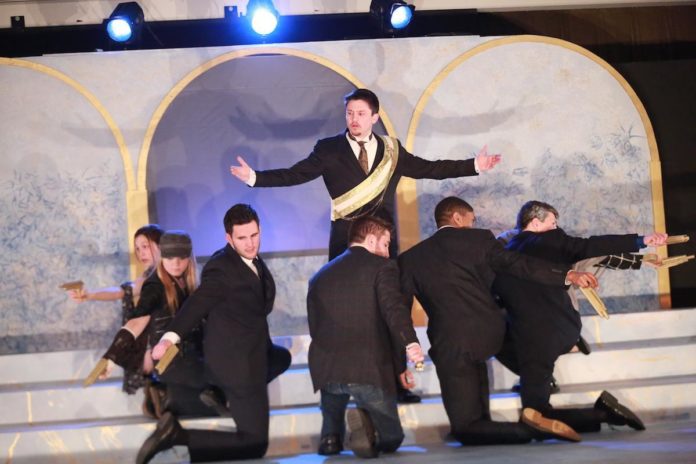Under the direction of Dr. David Skeele, the classic Shakespeare tragedy “Julius Caesar” takes place in an alternate reality of modern-day Washington D.C.
“Rome of Caesar’s time feels like Washington [D.C.],” Skeele said. “When you really examine Washington D.C., you see that everything is fear and greed.”
Skeele said the initial desire to produce “Julius Caesar” came from a big popular movement made by the students, and he was excited because it was a Shakespeare work that he had never done. He also said he was excited to experiment with the show, as well as to begin helping the students grow.
“I love the fact that SRU never photocopies a Broadway production,” Skeele said. “There’s always an element of experiment, which gives the actors a really good challenge because you never really know how ideas are going to work until you try them.”
Some of the experimentation within this production includes the modern-day setting, the inclusion of video footage to aid storytelling and the changes made to fight scenes and large battle scenes. Skeele said the fight scenes have been transformed into abstract dance numbers, while the idea of drone warfare will represent the battle scenes; these changes helped cut the play down from its original run-time of about three hours to a 90-minute production.
Skeele mentioned that, with the political situation that is currently surrounding the United States, there are many productions of “Julius Caesar” taking place all over the country. He said that, when rehearsals began, the cast and crew did draw parallels. However, Skeele chose to not take that direction, and instead hopes to create this staged reality as an escape or distraction from actual reality.
The overall concept of Shakespeare’s Julius Caesar is centered more around the character of Brutus rather than the titular character Caesar. The play is about the main events surrounding the assassination of Caesar, and Brutus’s tragic story behind it all.
“This play is more the tragedy of Brutus than Caesar,” Skeele said. “Brutus has a reputation of being very good and noble while everyone around him is just trying to save their own skin.”
Senior theatre-acting major Tyler Hahn portrays the titular character Caesar, a role which he said was difficult but enjoyable. Hahn said that anytime an actor takes on the role of a well-known, iconic character like Caesar, that actor has to bring their own work into it, as opposed to simply portraying it as someone else has already. Hahn also pointed out that the role of Julius Caesar is especially difficult because of the desire to completely encompass Caesar’s ego while still keeping the character relatable.
“This is a man who has surpassed his own status,” Hahn said of his character. “As an actor, everything has to be manipulated into this man who carries himself as a god, but he can’t become so foreign that the audience forgets he’s still a person.”
Hahn said much of the full development of his role was aided by Skeele and the production team behind the show because Skeele allows the cast and crew to make creative and bold artistic choices; Hahn also said he really enjoyed the choices made by the creative team.
“You can’t totally do your job as an actor until you experience the design, until you put those shoes on and walk onto the complete set and into the show,” Hahn said.
One of the creative team members is senior theatre design/technology and anthropology double major Gabriella Petro, who was the sound designer for the show. Petro said her favorite part about SRU theatre productions is that the general motto is ‘go big or go home,’ and this show certainly did not ‘go home.’
“One project I had to create for this show was only described as ‘an explosion of screams,'” Petro said. “That was definitely interesting.”
Petro said she also enjoyed this show because of how well it reflects the current political situation, and how it’s a direct, stylized version of real-life.
“Julius Caesar” is showing March 3-4 and March 6-9 at 7:30 p.m. in the MPR in the Old Student Union.








